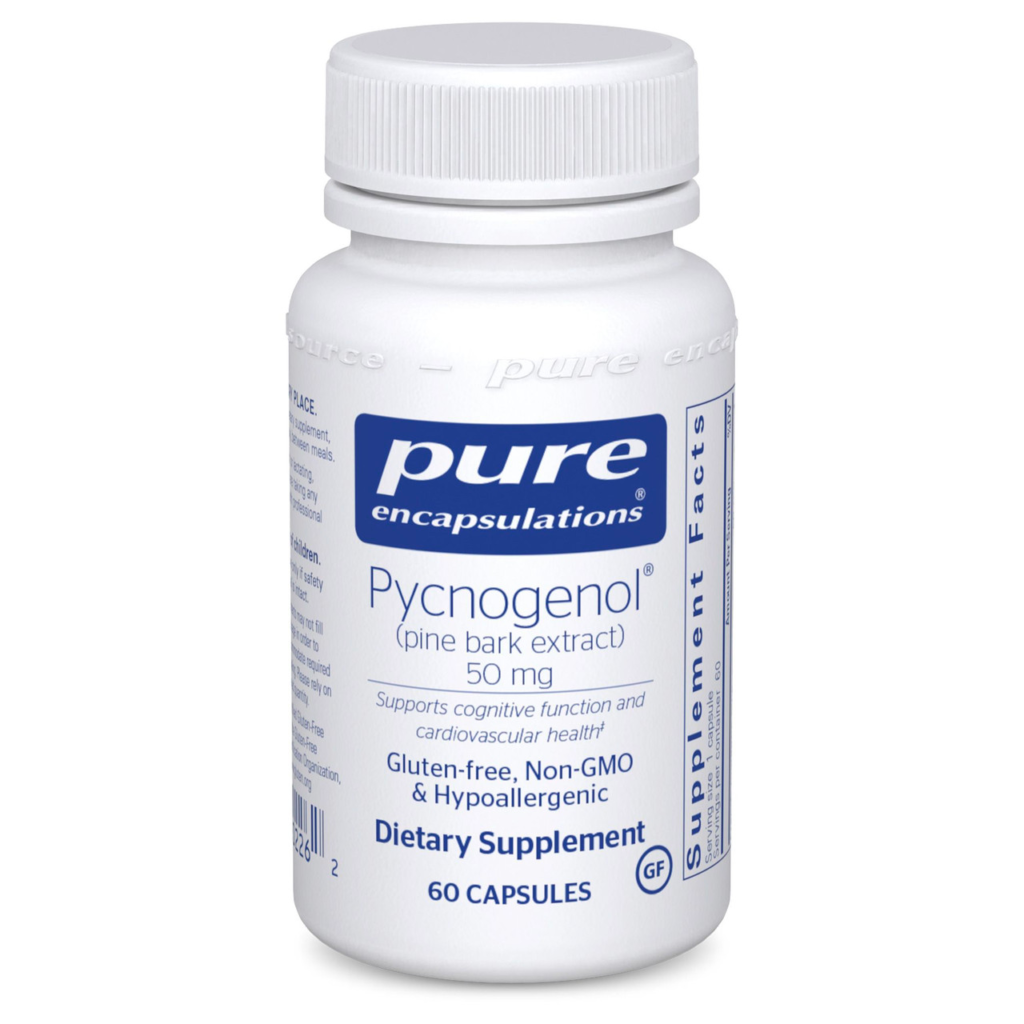Pycnogenol is the US trademarked brand name of a supplement extracted from the bark of the French maritime pine tree, Pinus pinaster. It contains a unique variety of bioflavonoids that have potent anti-inflammatory and antioxidant properties.
This extraordinary nutraceutical can offer a wide range of benefits for your body and mind. From improving cardiovascular health and reducing inflammation to promoting healthy skin.
In short, pine bark extract is a versatile supplement that could be just what you need to take your wellness to the next level.
But as with any nutritional product, it’s crucial to fully understand Pycnogenol’s uses and potential side effects before incorporating it into your routine.
Today you’ll learn how pine bark extract works for your body. We’ll explore its science-backed uses and any safety considerations you should be aware of to help you use Pycnogenol effectively.
5 Evidence-Based Uses of Pine Bark Extract


The ingredients in Pycnogenol could have positive effects in several areas of human wellness. The supplement’s vitamins, flavonoids, and other phytonutrients promote health and may have the ability to improve the conditions in those with certain illnesses.
Here are the potential benefits of adding a pine bark supplement to your daily regimen.
1. Reduces Allergy Symptoms

Allergies are a common health condition affecting millions of people worldwide, and their prevalence is increasing [1]. Reactions range from mild to severe, and can cause symptoms like sneezing, a runny nose, and a scratchy throat.
Pycnogenol may be helpful in reducing the discomfort associated with allergic reactions.
A randomized, double-blind, placebo-controlled investigation found that pine bark extract improved the symptoms of hay fever [2]. The research suggests the supplement naturally relieves nasal congestion and itchy eyes by lowering pollen-specific antibodies in the blood.
Scientists have also found that Pycnogenol reduces histamine levels in adults experiencing allergies [3].
It’s best to start using pine bark at least a month before hay fever season. This approach provides the best chance of defense against allergies, as the nutraceutical’s full benefits can take several weeks to manifest.
2. Improves Heart Health
Pycnogenol may support a healthy heart and cardiovascular system, thanks to its powerful antioxidant and anti-inflammatory properties.
Evidence suggests taking pine bark extract daily for five weeks could lower blood pressure and increase the body’s good cholesterol levels [4].
A daily dose of pine bark extract reportedly also improves blood flow through the arteries and reduces amounts of isoprostane — an indicator of oxidative stress [5].
Although Pycnogenol appears to aid the mechanisms of a healthy heart, it’s unclear whether it’s effective at treating specific conditions. We suggest using the supplement to reduce your cardiovascular disease risk factors rather than relying on it to help an existing illness.
3. Eases Asthma

Asthma is one of the most common chronic respiratory diseases in the world. Inflammation and narrowing of the airways characterize the condition, and can cause wheezing, shortness of breath, and a tight chest.
These indications range from mild to severe, with allergens, pollutants, exercise, or stress often triggering them. While there’s no cure for chronic asthma, the illness is manageable with proper treatment and care.
Pycnogenol supplementation may help ease asthma by improving lung function in adults [6]. Patients who took the nutriceutical for four weeks demonstrated an increased forced expiratory volume and a reduction in the severity of their symptoms.
Pine bark extract could also lower the levels of inflammatory cytokines in asthmatic patients, reducing their need for rescue medications [7].
The supplement might also improve respiratory health in children who have asthma. A study on 60 minors with the condition showed that taking Pycnogenol improved their breathing capacities and reduced the occurrence of severe attacks [8].
4. Enhances Athletic Performance

Physical activity is a crucial part of maintaining health and well-being. Regular exercise provides numerous benefits, including improved cardiovascular function, enhanced cognitive processes, and a reduced risk of chronic diseases [9, 10, 11].
However, many of us struggle to see improvements in our athletic performance despite our best efforts. Pine bark extract could be valuable in these situations, as research shows it might boost physical function in several ways.
Pycnogenol reportedly promotes the release of nitric oxide (NO), a vasodilator that relaxes blood vessels [12]. This improved flow of the vital liquid can enhance the delivery of oxygen and nutrients to the muscles during exercise.
Additional studies show the supplement may help to support the human vascular endothelial cells, which play an essential role in regulating blood flow [13].
These findings demonstrate that pine bark extract could help your body reach optimal performance by ensuring it receives a healthy, unimpeded oxygen supply.
Research has also discovered that Pycnogenol may increase endurance by improving the efficiency of energy production [14]. This effect might help delay the onset of fatigue during workouts, allowing you to exercise for longer.
5. Improves Skin Health

The quest for a healthy, youthful-looking face is a priority for many individuals, and it’s little wonder why. Our dermis is both the body’s largest organ and a reflection of our well-being. Fortunately, there’s excellent news for the skin-conscious.
Researchers have found that supplementing your diet with maritime pine bark extract could result in a glowing complexion [15].
This small clinical trial suggests ingesting Pycnogenol improves skin elasticity and hydration by increasing the synthesis of hyaluronic acid and collagen. These compounds are both ingredients in popular anti-wrinkle beauty products.
It also appears that pine bark reduces the creation of free radicals and encourages cell regeneration and replication, ultimately reducing the effects of aging [16].
Clinical trials have also shown that incorporating the nutraceutical into your topical routine reduces scar formation, as pycnogenol accelerates wound healing.
Side Effects of Pine Bark
Pycnogenol doesn’t cause side effects for most people, but be cautious and start with a low dose to monitor how your body responds.
The following reactions could occur in certain individuals:
| Side Effect | Precautions |
| Dizziness | Avoid activities requiring mental alertness or physical coordination until you know how Pycnogenol affects you |
| Headache | Stay hydrated and consider adjusting to a lower dose |
| Mouth ulcers | Discontinue use and consult a healthcare professional |
| Nausea or stomach pain | Take Pycnogenol with food |
| Skin irritation | Discontinue use and consult a healthcare professional |
It’s safe to consume 50–450 milligrams of pine bark extract daily for one year or use as a skin cream for about seven days.
There aren’t enough studies to recommend protocols on children’s doses, so work with your pediatrician to determine a treatment plan.
Now before we move on, let’s take a quick look at how Pycnogenol came to be!
The History of Pycnogenol: From Tree Bark to Nutraceutical
The history of Pycnogenol dates back hundreds of years, with ancient civilizations like the Greeks using pine bark to treat various ailments.
In the 16th century, French explorer Jacques Cartier reportedly used the woody husk to cure his crew’s scurvy during their voyage to Canada [17].
French scientist Dr. Jacques Masquelier discovered the potential health benefits of pine bark in the 1940s. He began studying oligomeric proanthocyanidins (OPCs), bioflavonoids in the tree, and found their antioxidant characteristics might protect the body from oxidative damage and inflammation [18].
In the 1960s, Masquelier developed his patented extraction process to isolate proanthocyanidins from pine bark, producing Pycnogenol. The nutriceutical has since been the subject of various scientific studies exploring its potential for enhancing health.
Is Pycnogenol Right For You?
Whether Pycnogenol is right for you depends on your needs and health goals. While the nutriceutical shows promising results in various studies, consult your doctor before incorporating it into your diet.
Remember that no supplement replaces a healthy diet and lifestyle. Pine bark extract could be a valuable addition to your wellness plan, but you shouldn’t rely on it as a sole solution.
Simply Nutrients is always available to help you make the best decisions about your well-being. We believe everyone deserves access to safe, effective, and affordable nutritional supplements, and we’re committed to providing premier quality products backed by the latest research.
Contact us today to learn more about how we can support your wellness goals.
Resources
[1] https://www.aaaai.org/tools-for-the-public/conditions-library/allergies/prevalence-of-allergies-and-asthma
[2] https://onlinelibrary.wiley.com/doi/abs/10.1002/ptr.3232
[3] https://onlinelibrary.wiley.com/doi/abs/10.1002/ptr.1240
[4] https://pubmed.ncbi.nlm.nih.gov/27765365/
[5] https://pubmed.ncbi.nlm.nih.gov/22240497/
[6] https://www.liebertpub.com/doi/abs/10.1089/10966200152744472
[7] https://europepmc.org/article/med/22108478
[8] https://www.tandfonline.com/doi/abs/10.1081/JAS-200038433
[9] https://www.ncbi.nlm.nih.gov/pmc/articles/PMC6557987/
[10] https://pubmed.ncbi.nlm.nih.gov/25773610/
[11] https://www.sciencedirect.com/science/article/pii/S266633761930006X
[12] https://journals.lww.com/cardiovascularpharm/Fulltext/1998/10000/Endothelium_Dependent_Vascular_Effects_of.1.aspx?crsi=662496819&cicada_org_src=healthwebmagazine.com&cicada_org_mdm=direct
[13] https://www.nature.com/articles/hr2007107
[14] https://www.ncbi.nlm.nih.gov/pmc/articles/PMC8079890/
[15] https://www.karger.com/Article/Abstract/335261
[16] https://www.longdom.org/open-access/pycnogenol-a-miracle-component-in-reducing-ageing-and-skin-disorders-2155-9554-1000395.pdf
[17] https://www.ncbi.nlm.nih.gov/pmc/articles/PMC2647905/
[18] https://www.masqueliersopcs.com/en/news/jack-masquelier-and-opcs-bark-french-maritime-pine-tree
NOTHING IN THIS WEBSITE IS INTENDED AS, OR SHOULD BE CONSTRUED AS, MEDICAL ADVICE. ANY HEALTHCARE AND/OR NUTRITIONAL MATERIAL CONTAINED IN THIS WEBSITE IS FOR CONSUMER INFORMATIONAL AND EDUCATIONAL PURPOSES ONLY. SUCH MATERIAL IS NOT INTENDED AS MEDICAL ADVICE FOR CONDITIONS OR TREATMENT, NOR IS IT INTENDED AS A SUBSTITUTE FOR A MEDICAL EXAMINATION BY A HEALTHCARE PROFESSIONAL. CONSUMERS SHOULD CONSULT THEIR OWN HEALTH CARE PROFESSIONALS FOR INDIVIDUAL MEDICAL RECOMMENDATIONS.
- Magnesium Threonate: An Honest Buying Guide for Health Enthusiasts - March 21, 2024
- Magnesium Citrate Vs Glycinate: 5 Key Differences And Benefits - March 14, 2024
- How to Pick the Best Magnesium Glycinate Supplement for You - March 7, 2024




